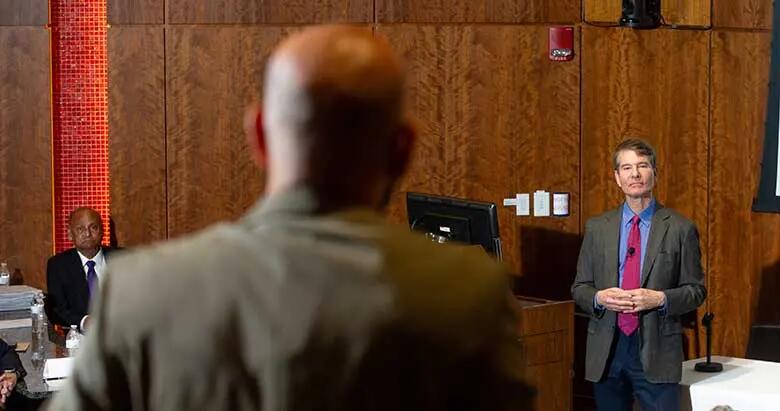
No certain remedies for the latest issues rattling nation’s biopharma industry
The biopharmaceutical industry faces huge challenges from a tariff war with China, supply chain issues and, possibly, even talent shortages, as the Trump administration’s policies on trade and immigration play out, an industry veteran told an audience at a healthcare symposium sponsored by the Blanche and Irwin Lerner Center for the Study of Pharmaceutical Issues at Rutgers Business School.
Ron Cohen, the founder and former CEO of Acorda Therapeutics, warned about the “toxic brew” of issues in Washington, that include massive funding cuts and layoffs at the National Institute of Health and the Food and Drug Administration.
“Many important drugs were born of NIH funding,” Cohen said, adding that much of the early research happened in academic settings. “It’s an essential funder of research that the industry cannot fund,” he said.
The uncertainty comes as the industry faces huge business pressures and incredible promise, Cohen said. The cost of developing a new medicine has reached an eye-popping $2.6 billion and China’s biopharma industry grows more competitive with the U.S. Meanwhile, new technologies, including AI, may be “the single biggest contributor” to treatments that were historically untouchable, he said.
“We are blessed to be living in the most exciting era of human endeavor,” he said as he spoke about potential breakthroughs in treatments for Alzheimer’s and the new generation of medicines for obesity and other illnesses.

After his talk, Cohen fielded questions from the audience about a variety of issues, including the controversial Inflation Reduction Act, which Cohen described as “the least of our problems now.” An MBA student asked Cohen to name the highest priority for getting the industry back on track in light of the current challenges.
“All of it is the highest priority,” Cohen said, from continuing to fight to stop the administration’s cuts and continuing to use technology to advance the development of new treatments.
“We don’t know which of the current trends will take hold,” he said. “The odds are,” he added, “we could be in another golden age 10 years from now.”
Cohen’s keynote was followed by a panel discussion among industry leaders, including former FDA Associate Commissioner Peter Pitts, Kirsten Axelsen, a fellow at the American Enterprise Institute, and Richard Bagger, the former executive vice president of Celgene.
The annual symposium is part of the legacy of Irwin Lerner, former chief executive of Hoffman LaRoche and a giant in the pharmaceutical business. Lerner endowed the center 21 years ago as a way to connect academia with the industry. The center’s board and Professor Mahmud Hassan, the center’s director, maintain Lerner’s vision, which includes the annual symposium.
In remarks at the start of the symposium, Lerner’s son, Michael, an attorney who shares his father’s passion about the center’s mission, described thought leadership as its hallmark. “It is through collaboration and dialogue that we can make a difference,” he said.
The Lerner Center is also credited with being instrumental in Rutgers Business School’s strong connections to New Jersey’s biopharmaceutical industry and the MBA program’s success in nurturing future leaders for the industry.
Press: For all media inquiries see our Media Kit


